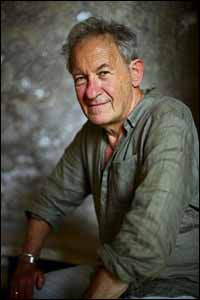|
PROFILE Biblical tales gave Schama his first taste for history | |
SIMON SCHAMA believes it is his Jewish background which motivated him to be a historian.
Simon -who presents BBC Two's five-part series, The Story of the Jews, from Sunday (9pm) - told me: "I grew up in that rather grey difficult time of the late 1940s and early 1950s. "In the Bible stories that I learned at home and at cheder, you had Moses and David and all the rest, which was kind of epic. It was so historically rich. "The figures in it, for good and ill, are incredibly vivid, historical actors. That was one half of what fired my historical imagination." Simon, who grew up in Golders Green and Westcliffe-on-Sea, came from a mixed marriage -that of a Sephardi to an Ashkenazi. His mother's Steinberg or Steinbach family came to London in the 1890s from Kovno, in Lithuania. His father's Sephardi family originated from Smyrna in Greece before they spent a generation in Moldova and Romania. "Some of my distant relatives in Israel are still more strenuously Sephardi," Simon said. "We were mixed. We called ourselves Sephardi trash. "I grew up mainly in Golders Green. Our shul was the United Synagogue in Dunstan Road. We had a kosher kitchen, but we ate out. But we were in shul every Shabbat. I had a mega barmitzvah, in which I read the whole sedra. "I actually taught chumash in cheder although I wasn't much good at it." These days living in New York, Simon attends a Conservative synagogue. He said: "I do like the idea of the non-separation of the sexes. We have a lot of evidence from the archaeology of the early synagogues that men and women were not separated until much later in the rabbinic period. "It's quite clear that until at least the 11th century, women held their sons during a brit mila. It was Rabbi Meir ben Baruch, of Rothenburg, in the 13th century, who thought it was improper. There are stories of women in the early Middle Ages taking services. "It was richly part of the tradition. I like the more expansive view." The Story of the Jews celebrates the diversity of the Jews and especially their ability to not only survive, but flourish despite the vicissitudes of fortune throughout the ages. It begins in Bible times and continues to the present day. "Our story is very rich, very complicated and full of resilience," he said. "We are not just victims. The great triumph of Judaism is our ability to endure and survive and to make an act of faith and hope. Our history is full of celebration." Referring to the beautiful Hebrew Bible in the Bodleian Library, which was completed 15 years before the Jews' expulsion from Spain, he said: "It was not with a sense of trepidation, fearfulness or anxiety that catastrophe was round the corner. "Jews don't assume the worst, but they are prepared for it. One of the other great triumphs, to which I allude, is that we were the first culture to develop a portable form of religion. "The mezzuza's miniature writing and our portable Sifrei Torah made our sacred books moveable. We carry tephillin on our bodies. We carry the words with us. That's unique. "All other religious cultures were embedded in immovable monuments, like the Pyramids and Roman architecture. We carried it in our bodies and inside our heads". Although Simon realises that the BBC often has a bad press in the Jewish world because of its alleged anti-Israel news slant, he could not be more fulsome in his praise of their promotion of his programme, which was scheduled specifically to coincide with the Jewish festival period. Simon said: "The festivals were not far from the mind of the BBC. I told them that it's a time when Jews who are estranged come back and think about their Jewishness. They were very good. They knew the dates. I told them to make sure we didn't go out on Kol Nidrei. They were very well aware of that. "They have been really wonderful, with real menschy hospitality, nothing but trust and confidence. The BBC has been nothing but incredibly supportive." Simon feels the series is especially important in the light of the current spate of anti-Israel propaganda. He said: "I think we are living in a difficult period in terms of our relationship with the non-Jewish world, especially in the Middle East. We are seen either as victims or as conquerors of the West Bank. I think those are bad stereotypes. "There was a terrible soap opera, Khaybar, which was very popular during this year's Ramadan in Egypt. It was such popular TV, but it had the most grotesque antisemitic stereotypes that Jews are only interested in money and teaching their children to be swindlers. It was truly vile and horrible. "We are fighting stereotypes all the time. The Protocols of the Elders of Zion is flourishing in the Arab world more than ever. "The TV series and its accompanying books are my little contribution to try to connect non-Jews to Jews." The series and two-volume book, The Story of the Jews: Finding the Words (1000 BCE- 1492), published by Bodley Head on September 12, are not Simon's first Jewish works. Some time ago he wrote The Two Rothschilds and the Land of Israel and has written journalistically and held university seminars on Jewish history with Nicholas de Lange at Cambridge. Researching for this TV series, he found new archaeological evidence in Israel backing up the ancient dating of the Hebrew Bible as well as olive tree carbon dating which confirmed the timing of King David's Judean kingdom - discoveries which he found exciting.
|
